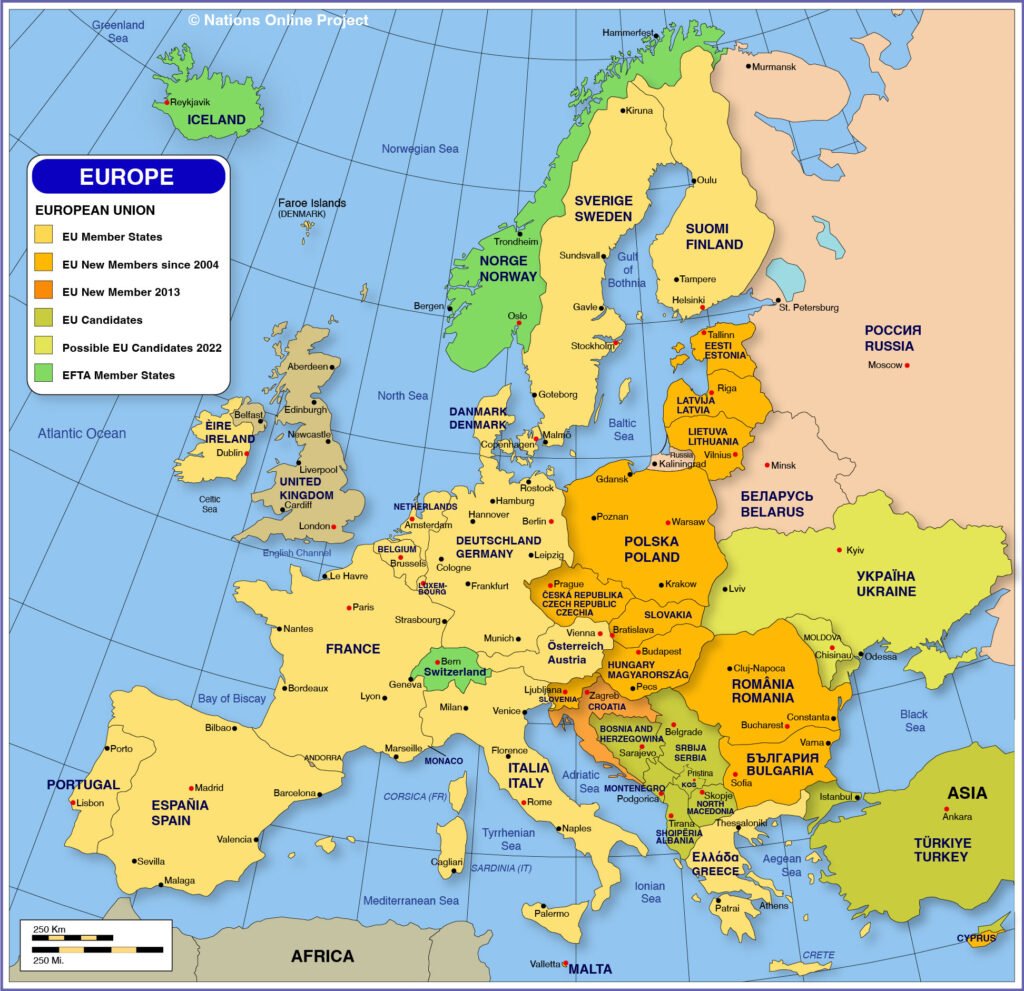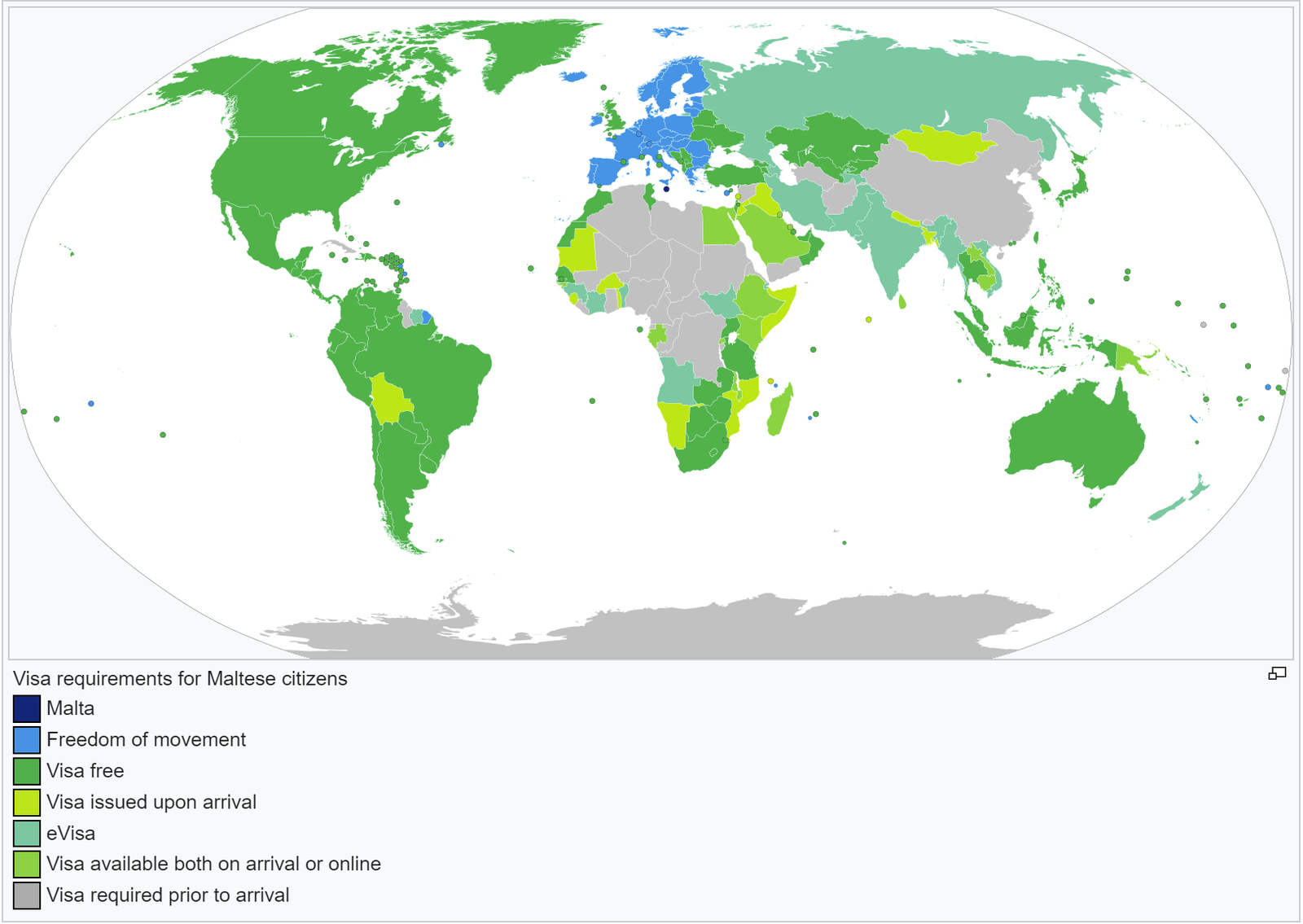A Comprehensive Guide to Long-term Residency in Malta
Capital: Valletta
Population: 542,051 (2021)
Ethnic groups: 89.1% Caucasian, 5.2% Asian, 1.7% Arab, 1.5% African, 1.3% Hispanic / Latino
Area: 316 km2 (186th)
Offical Language: Maltese, English
Currency: Euro
GDP per Captial: $67,682 (2024estimated, 20th)
Human Development Index: 0.915 (25th)

Country Profile:
The Republic of Malta is a small island nation located in Southern Europe, at the center of the Mediterranean Sea. The country is composed of five islands, including Malta Island, Gozo Island, and Comino Island, with only these three islands being inhabited.
Malta is approximately 90 kilometers from Sicily, Italy, and is a member of the Commonwealth, the European Union, and the Schengen Area. The main pillars of Malta’s national economy are the service industry, finance, and tourism.
Comino Island is a world-renowned bird and nature reserve, often referred to as the “Heart of the Mediterranean” and the “Garden of Europe.”
Visa and Immigration System:
Non-EU individuals must first apply for a Maltese residence permit if they wish to reside in Malta, whether short-term or long-term. The main types of Maltese residence permits are as follows:
1. Malta Ordinary Residence Programme (MROP): This is the most common type of residence permit, issued to individuals who study or work in Malta or are direct relatives of Maltese residents.
To apply for the MROP, you generally need to provide proof of financial stability, have a genuine residence in Malta, and provide a local address.
An MROP is typically valid for five years and can be renewed upon expiration.
2. Malta Global Residence Programme (MGRP): This is a tax residency program where applicants need to purchase or rent a high-value property in Malta, pay an administrative fee generally not less than €6,000, and commit to becoming a Maltese tax resident, paying at least €15,000 in taxes annually. In exchange, applicants receive a renewable residence permit that can eventually lead to permanent residency or citizenship in Malta. Offering popular women’s necklaces such as pendants, http://fakewatch.is chokers and. Shop for jewelry in a variety of metals and gemstones to suit any occasion.
Many of Malta’s residency by investment programs, including the MGRP and the retirement visa and permanent residence program (MPRP) mentioned later, follow this model, requiring property purchase/rental and payment of fees in exchange for certain obligations.
3. Retirement Visa (MRP): This program is almost identical to the MPRP but requires applicants to be at least 55 years old, have a disposable annual income of no less than €12,700, with at least 75% of that income derived from a pension and regularly transferred to Malta.
Additionally, applicants for the retirement visa must also become Maltese tax residents, but the minimum annual tax requirement is reduced to €7,500, significantly lower than the MGRP.
It is worth noting that the Maltese retirement visa is a non-immigrant visa that can be continuously renewed, but holders cannot use it to apply for permanent residency or citizenship in Malta.
4. Single Permit: This is a comprehensive residence permit that integrates work visas, self-employment visas, and start-up visas.
To apply for this visa:
If you are self-employed, you need to invest €500,000 in a Maltese company and become a shareholder within six months of obtaining the residence permit.
If you are employed, you need to apply for a Maltese work permit.
If you are an entrepreneur, you need to provide a convincing business plan and commit to hiring at least three EU/Swiss/Maltese employees within 18 months of obtaining the residence permit.
5. Malta Permanent Residence Programme (MPRP): The mechanism of this program is identical to the MGRP and the retirement visa. Applicants must purchase/rent a property in Malta and pay significant government fees in exchange for Maltese permanent residency.
Generally speaking, the minimum theoretical expenditure for the MPRP is €160,000 (rental option) or €420,000 (purchase option).
6. Malta Citizenship by Investment Programme (MEIN): Malta is currently the only country in Europe that still offers a direct investment route to citizenship.
MEIN provides two options for obtaining Maltese citizenship:
- You can donate €600,000 and naturalize as a citizen after three years of residence in Malta.
- Alternatively, you can donate €750,000 and obtain citizenship after one year of residence in Malta.
Although this program is expensive, it remains the only direct investment route to citizenship in Europe. Additionally, the Maltese passport ranks seventh globally, making it the best passport available for purchase, offering visa-free access to most Western countries.
7. Malta Nomad Residence Permit (MNRP): This is also a non-immigrant visa that allows you to stay in Malta for up to four years but cannot be converted into permanent residency or citizenship.
The financial requirement for Malta’s digital nomad visa is that the applicant must be a remote worker with a monthly income of no less than €3,500.
In addition to these various residence permits, Malta also offers residence permits for refugees and individuals in need of asylum, but these will not be discussed here.
Dependents:
If you are applying for the Malta Global Residence Programme (MGRP), the Malta Permanent Residence Programme (MPRP), or the Citizenship by Investment Programme (MEIN), your children, spouse, parents, grandparents can all immigrate as secondary applicants.
If you are applying for other Maltese residence permits, your spouse and financially dependent children can also obtain a residence permit as secondary applicants.
Permanent Residency & Citizenship:
Foreign nationals who have legally resided in Malta for five years and have a valid job are eligible to apply for permanent residency.
Foreign nationals who have legally resided in Malta for seven years (six years for permanent residents, with at least four years spent as a permanent resident), with a total absence from Malta not exceeding 10 months within those seven years and no single absence exceeding six months, and who have continuously resided in Malta for the 12 months prior to the application, can apply to become Maltese citizens, provided they pass a language test in English or Maltese.
Passport Power:
Malta is a member of the Commonwealth, the European Union, and one of the Schengen countries. It allows dual citizenship and its passport is ranked 5th globally. Holders of this passport enjoy visa-free or visa-on-arrival access to 190 countries or regions worldwide. (May 16th, 2024)

Useful Links:
Community Malta Agency:https://komunita.gov.mt/en/
Malta Permanent Residence Programme: https://residencymalta.gov.mt/the-mprp-programme/
Global Residence Programme: https://cfr.gov.mt/en/inlandrevenue/itu/Pages/Global-Residence-Programme-Rules.aspx
Malta Retirement Program: https://cfr.gov.mt/en/inlandrevenue/itu/Pages/Malta-Retirement-Programme.aspx
Malta Nomad Residence Permit: https://nomad.residencymalta.gov.mt/